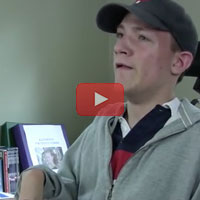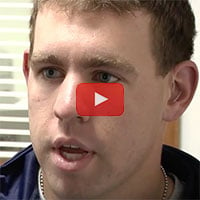Understanding Academic Accommodations
Colleges are not responsible for making sure students with disabilities are successful academically, just that they have access to the same educational opportunities as every other student. College students with disabilities often use academic accommodations so they can do the same course work as their peers. Parents and youth should seek to understand the accommodations process and what accommodations work best for each individual student.
What is a Disability Services Office?
The transition to college or university can be both a thrilling and nerve-racking experience. You may be looking forward to the increased opportunities and independence but wonder how your supports and accommodations will be met. Fortunately, most postsecondary schools have an office to help you with accessibility, accommodations, and assistive technology on campus.
These offices are often called “disability services,” and will work with you to help meet your needs so you can access an academic program of study. You will have a representative that you can contact any time with concerns or requests for assistance. It is their duty to aid you by creating environments of equitable access, from classes to extracurricular activities, and on-campus housing. Academic standards will not be altered, but the mission of disability services is to create equal opportunity for access.
Examples of Accommodations
Accommodations will vary from person to person based on how your disability affects you, as well as the school and amount of resources they devote to student services.
Accommodation for Testing: Commonly, these include an alternate testing location (testing center) or exam formats, extended time, private rooms, use of a computer or other assistive technology, breaks, and readers or scribes. If you require assistive technology to access exams, classes, or labs, disability services may provide these tools at no cost to you.
Academic Adjustments and Classroom Accommodations: Common accommodations include priority registration, accessible seating, note takers, permission to record lectures, use of a laptop, materials in advance, and occasional assignment extensions. Notetakers are typically students paid by disability services that may or may not be in your degree program. Often, they are students also enrolled in the same class. You can request how you’d like your notes to be taken and choose whether you want your notetaker to sit by you or not. In lab, they may be able to help you participate in hands-on activities. If you are meeting with a group on campus for a class, or doing a university supported activity, you may be able to ask for a notetaker to accompany you. Alternatively, your instructor and disability services can help you find a classmate willing to share their notes with you throughout the semester. For textbooks and class materials, you can receive alternate formats if needed. If you get into a course related dispute with an instructor, disability services can act as a mediator to help you resolve an issue that is fair and reasonable for both you and the instructor.
Navigating the Campus: Disability services may provide support in other areas as well. If you need to park your vehicle a certain place on campus, like near a dorm or building, they can secure you a parking pass for a lot or campus, but you may need to pay for it. Disability services can help you find accessible housing on campus, private or shared dorm rooms, and may help with basic modifications in your room, such as an automatic door button.
Connect with Disability Services & Provide Documentation
When considering schools, contact disability services to learn more about how they may be able to support you. Getting your needs met will be essential while pursuing your degree of interest. After choosing a school and being accepted, contact disability services for an initial meeting. Be prepared to provide documentation of your disability; this requirement varies by school. Documentation may include an IEP, 504 Plan, vocational assessment, mobility assessment, or statement from a qualified health professional. Your school’s website may have additional information on accommodations they offer and documentation requirements.
The information about your disability you share with your disability services representative is confidential. Once you agree on accommodations, he or she will often write an official accommodations letter. This letter will have your name, the name of the disability services staff person and their contact information, a statement that you have a documented disability, and a list of suggested accommodations. It is your responsibility to share your letter with course instructors and discuss it with them. Disability services staff may have suggestions on how to effectively communicate with course instructors. If you would like changes made to your accommodations at any point, contact your representative.
Questions to Ask
Admission and Registration
- How much information do I need to share about my disability with the disability services office? How recent does my documentation need to be?
- How is confidential information handled? What is shared with my instructors?
- Are there any other students on campus who have similar disabilities to mine? Is there any way that I can connect with them?
- What is the role of the disability services office? What level of services does it provide?
- What is my role in accessing disability services? What role, if any, will my parents play?
- What accommodations for applying to the school and registering for classes are available to me?
Accommodations or Academic Adjustments
- How do I inform instructors and other faculty and staff of my need for accommodations? What are the steps I need to take?
- What type of note-taking accommodations are available to me?
- How will labs and clinical placement settings be accommodated?
- Can an instructor refuse to provide an accommodation approved by the disability services office? What happens if this occurs?
- If I need assistive technology or a reader/scribe for an exam, where will I take my exam?
- Will I receive extra time for my exams?
- Are there private testing rooms?
- Is there a tutoring service for students with disabilities? Is there a fee for this service?
- If I need an assignment extension, do I need to tell my disability specialist?
Assistive Technology
- What type of assistive technology is available? Is the particular computer program or hardware I used as an accommodation in high school available at this school? Will they purchase it?
- How much advance notice is needed to convert my course materials into an alternate format? What happens if I receive my materials late due to the speed of conversion or due to my instructor picking the course materials right before class starts?
- How are textbooks delivered to me once they have been converted to a digital format?
- Does the college use online course management software such as Moodle, Schoology, or Canvas? Is the software accessible?
- Is there an assistive technology lab on campus? Will it be equipped with the software and hardware that I need and use?
Campus Accessibility
- Can I get a custom tour that highlights how to navigate campus as a person with a disability?
- Are all buildings equipped with door buttons, elevators, ramps?
- If campus doors lock at a certain time, can I still have access?
- Is there a tunnel system? Are there maps?
- Is specialized transportation available on campus?
- Can my PCA get a free on-campus student metro pass?
- Is the cafeteria accessible for students who have a physical disability?
- Are dorm rooms accessible?
- Can I get a private room with a bathroom?
This content was developed by Deandra Bardell, a PACER Intern, who is a University of Minnesota Twin Cities, College of Science and Engineering student. She has Cerebral Palsy and uses a power wheelchair. In May 2018, she completed her Bachelor of Science in Mathematics, and is pursuing her second B.S. in Computer Science. Read Deandra’s personal account of her experience working with the University of Minnesota’s disability services office.
Videos

Assistive Technology in Action: Meet Sam

No Barriers - Technology for College-Level Reading

Transitioning to College with a Disability

Disability Resources: A Student Perspective
For more videos on this topic, visit our Videos page.

